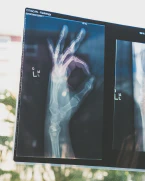Poetic Healing: From Genocide Witness to Resilience

Witnessing Genocide: How Poetry Gave Me Courage
In the face of unimaginable violence and despair, it can be hard to find the strength to speak up and advocate for change. But for many survivors of war and genocide, the power of poetry and witness can be transformative. This was the case for one young woman who grew up in Darfur during a time of great upheaval and suffering.
As a 10-year-old, she learned the word “genocide” and witnessed the brutal attacks on her people because of their race. Her parents spoke out against the crisis, but she felt powerless and alone. She turned to poetry as a way to convince others to see and hear the truth of what was happening. Through her words, she hoped to inspire courage and empathy in those who were far removed from the conflict.
But when she was asked to give a presentation about Darfur in high school, she faced resistance and even hostility from some of her classmates. They questioned why she had to talk about this issue and suggested that it was not their concern. She felt a renewed sense of isolation and invisibility, as if her story and the stories of her people did not matter.
Despite these challenges, she found the courage to speak up and share her truth. Through the power of witness, she was able to connect with others and create a sense of community in the face of great adversity. She learned that poetry could be a tool for advocacy and healing, a way to inspire empathy and understanding in even the most apathetic of listeners.
This young woman’s story is a testament to the toughness and courage of survivors of war and genocide. It shows us that even in the darkest of times, we can find hope and inspiration through the power of witness and the spoken word. By listening to the stories of those who have suffered, we can begin to understand the true human cost of violence and injustice, and work towards a more just and peaceful world.
Finding My Voice in the Face of Silence and Invisibility
For many survivors of war and genocide, finding their voice and speaking out can be a daunting and painful process. In the face of violence and despair, it can be hard to believe that our stories and experiences matter. But as one young woman learned, the power of witness and the spoken word can help us find our way back to ourselves and to each other.
Growing up in Darfur during a time of great upheaval and violence, this young woman felt isolated and invisible. She and her family were forced to remain silent about the crisis, as speaking out could mean retribution from those in power. But the weight of this silence was crushing, and she longed for a way to connect with others and share her truth.
Through her poetry and advocacy work, she was able to find a way to speak out and break the cycle of silence and invisibility. She learned that by sharing her story and the stories of her people, she could inspire others to see and hear the truth of what was happening. She found the courage to stand up to those who doubted or dismissed her experiences, and to demand recognition and justice for those who had been silenced.
This young woman’s story is a powerful reminder of the importance of bearing witness and speaking out against injustice. By refusing to remain silent, she was able to find her voice and inspire others to do the same. She shows us that even in the face of great adversity, we can find strength and toughness by connecting with others and sharing our stories. Her work is a testament to the transformative power of the spoken word, and a call to action for all those who seek a more just and peaceful world.
The Power of Witnessing: A Personal Journey
For many survivors of war and genocide, the act of bearing witness to their experiences can be a transformative and healing process. By sharing their stories with others, they are able to break through the cycle of silence and isolation that often accompanies trauma. As one young woman learned, the power of witness can help us find our way back to ourselves and to each other.
Growing up in Darfur during a time of great violence and upheaval, this young woman felt alone and invisible. She and her family were forced to remain silent about the crisis, as speaking out could mean retribution from those in power. But the weight of this silence was crushing, and she longed for a way to connect with others and share her truth.
Through her poetry and advocacy work, she found a way to speak out and break the cycle of silence and invisibility. She learned that by sharing her story and the stories of her people, she could inspire others to see and hear the truth of what was happening. She found the courage to stand up to those who doubted or dismissed her experiences, and to demand recognition and justice for those who had been silenced.
Through this process of bearing witness and sharing her story, she was able to connect with others and create a sense of community and belonging. She found strength and toughness in the knowledge that she was not alone, and that her experiences mattered. She learned that the power of witness can help us find our way back to ourselves and to each other, even in the darkest of times.
This young woman’s story is a powerful testament to the transformative power of witnessing and sharing our stories. Through her work, she shows us that by refusing to remain silent and by bearing witness to our experiences, we can find our way back to ourselves and to each other. Her advocacy and poetry work is a call to action for all those who seek a more just and peaceful world, and a reminder that our stories and experiences matter.
From Darfur to France: How Laughter and Tears Connect Us
Despite the vast differences between our cultures and experiences, laughter and tears are universal human experiences that can bring us together in profound ways. As one young woman discovered, even in the face of unspeakable tragedy and loss, there is still space for joy and connection.
Growing up in Darfur during a time of great violence and upheaval, this young woman witnessed firsthand the devastating impact of war and genocide. She and her family were forced to flee their home and to live in constant fear of violence and persecution. But even in the midst of this darkness, she found moments of lightness and joy. She remembers how her grandmother could cure anything by talking the life out of it, and how she would make the young woman laugh even in the midst of their dire circumstances.
Years later, when the young woman found herself in France, far from her home and her family, she discovered that laughter and tears could still connect her with others. She found a community of people who had also experienced loss and displacement, and who could understand the power of laughter and tears in the face of adversity. Through poetry and storytelling, she found a way to connect with others and to share her experiences in a way that was both powerful and healing.
Through her work, she shows us that even in the midst of the darkest moments of our lives, there is still space for laughter and joy. She teaches us that by sharing our stories and our experiences, we can find common ground with others and build bridges of understanding and compassion. Her journey from Darfur to France is a powerful reminder of the human capacity for toughness and hope, and a call to action for all those who seek to build a more just and compassionate world.
Poetry as a Tool for Advocacy and Healing
For this young woman, poetry became a powerful tool for both advocacy and healing. Through her poetry, she was able to give voice to the experiences of her community and to bring attention to the ongoing crisis in Darfur. She used her words to paint a vivid picture of the devastation wrought by war and genocide, and to call upon the world to take action.
But poetry was also a means of healing for the young woman herself. Through the act of writing, she was able to process her own experiences and to come to terms with the trauma she had endured. In sharing her poetry with others, she found a sense of connection and community that helped to lessen the feelings of isolation and invisibility that can accompany experiences of trauma.
This young woman’s story is a powerful reminder of the transformative power of art and creativity. Whether through poetry, music, or other forms of expression, art can help us to process our experiences and to connect with others in profound ways. It can be a tool for advocacy, for healing, and for building bridges of understanding and compassion across cultures and communities.
As we continue to grapple with the ongoing crisis of violence and displacement around the world, we can look to the example of this young woman and the power of her poetry as a source of inspiration and hope. By hugging our creativity and using our voices to speak out against injustice, we can work towards a more just and compassionate world for all.
Surviving War and Genocide: Coping with Loss and Finding Joy
Surviving war and genocide is an unimaginable experience that can leave deep scars on the human soul. For this young woman, the loss of loved ones, the displacement from her homeland, and the ongoing violence she witnessed took a toll on her mental and emotional well-being. However, she also found moments of joy and connection that helped her to cope and find meaning in her experiences.
In her journey, she found that laughter and tears are both essential parts of the human experience. Even in the midst of great sorrow and pain, she discovered moments of humor and lightness that helped to counterbalance the darkness. And in moments of grief, she found that sharing her pain with others and allowing herself to feel vulnerable and seen was a source of healing.
Her story is a reminder that even in the darkest of times, there is still room for joy and connection. By hugging the full range of human emotions, we can find strength and toughness in the face of adversity. And by coming together in community, we can find support and understanding that can help us to heal and move forward.
Her experiences also highlight the importance of mental health and self-care in times of crisis. Survivors of war and genocide often carry invisible wounds that can impact their well-being long after the physical danger has passed. By prioritizing mental and emotional health, we can help to ensure that survivors have the resources and support they need to cope with their experiences and to find a sense of hope and meaning in their lives.
Overall, her journey is a testament to the toughness of the human spirit and the power of community and connection in times of hardship. Her story serves as a reminder that even in the midst of the greatest darkness, there is always hope for a brighter future.
The Paradox of Pain and Toughness: A Story of Zeinab
The speaker recounts the story of her cousin, Zeinab, who taught her about love and toughness in the face of pain and loss. Zeinab was bedridden in a hospital in France, and the speaker read her poetry to lift her spirits. The speaker describes how joy and laughter can be powerful tools for coping with grief and trauma.
Despite Zeinab’s physical limitations, she was able to find joy in life and share that joy with others. The speaker emphasizes the importance of focusing on the positive moments in life, even in the midst of great pain and sorrow. She suggests that joy can be a form of armor that helps us to endure difficult times.
Through the story of Zeinab, the speaker shows that even in the darkest of times, there is still hope and beauty to be found. She emphasizes the toughness of the human spirit and the power of love and connection to help us overcome adversity.
Speaking Up for Those Who Cannot: The Responsibility of Witnessing
In her speech, the speaker emphasizes the importance of witnessing and speaking up for those who cannot. She believes that as human beings, it is our responsibility to use our voices to bring attention to injustices and atrocities happening around the world.
She describes her own experiences witnessing genocide in Darfur and feeling invisible and powerless, but also finding her voice through poetry and speaking out in high school. She also speaks about the power of witnessing for healing and toughness, and how it connects us as human beings.
The speaker also tells the story of her cousin Zeinab, who was bedridden with a heart condition but still wanted to hear poetry on her deathbed. Through this experience, the speaker learned the importance of finding joy even in the face of pain and loss.
She ends by calling on all of us to use our voices to bear witness to the suffering of others and to speak out against injustice. She reminds us that we have a responsibility to do so, as we are all connected as human beings.
Conclusion
The power of witnessing can never be underestimated, especially in times of war and genocide. The stories of those who lived through such atrocities must be heard, and their voices must be increased. As we have seen from the examples given in this post, poetry and other forms of creative expression can be powerful tools for advocacy and healing.
Finding one’s voice in the face of silence and invisibility can be a daunting task, but it is a necessary one. The responsibility of witnessing requires us to speak up for those who cannot, to be the voice of the voiceless, and to make sure that the stories of those who have suffered are not forgotten.
The journey of survival and coping with loss is never an easy one. But as we have seen from the personal stories shared in this post, joy can be found even in the darkest of times. Laughter and tears connect us, and the memories of those we have lost can serve as a reminder of the toughness of the human spirit.
We must continue to advocate for peace and justice, to work towards ending the cycle of violence that has plagued our world for too long. It is only through the power of witnessing, through speaking up and sharing our stories, that we can hope to create a better future for ourselves and for generations to come.








